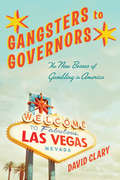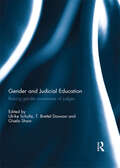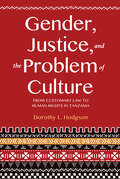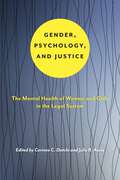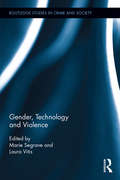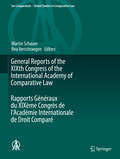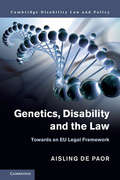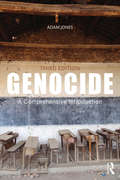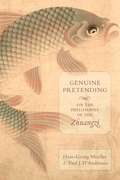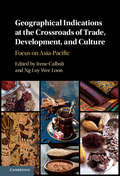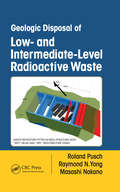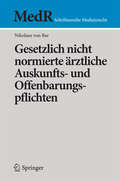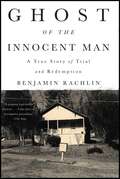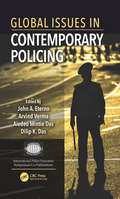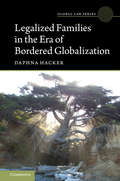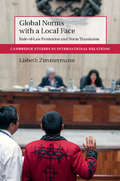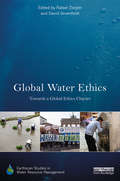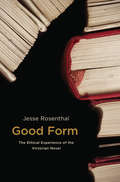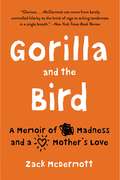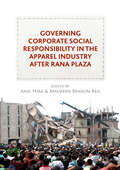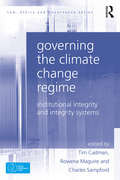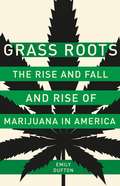- Table View
- List View
Gangsters Bancario$ Internacionales
by Juliana Arango James Morcan Lance MorcanDescripción del libro: ¿Quieres saber quién se encuentra manipulando ahora mismo los mercados financieros en secreto? ¡Entonces síguele el rastro al dinero! Gángster$ Bancario$ Internacionales identifica a los responsables de la enorme brecha financiera que separa al 1% de la población del resto del común de las personas, que representan el 99%. Entre los amos financieros que se ponen al descubierto en este libro se incluyen personas influyentes en los bancos de Wallstreet, en los bancos centrales europeos, en la Reserva Federal de los EE. UU., y en el Banco del Vaticano, así como en dinastías bancarias como las familias Rothschild y Rockefeller. Gángster$ Bancario$ Internacionales revela las verdaderas razones que llevaron a la oleada de crisis financieras recientes. Tales razones incluyen: el mundo secreto del “dinero negro” y el dinero del Viejo Mundo, cuyos mayores activos e ingresos permanecen sin ser declarados; el Sistema bancario central y la verdadera naturaleza de la Reserva Federal; las actividades financieras no tan santas del Vaticano; el FMI y el Banco Mundial y sus poco caritativos acuerdos con el Tercer Mundo; las medidas de austeridad que en la actualidad están siendo aplicadas sobre naciones vulnerables como Grecia; así como la teoría según la cual el suministro mundial de dinero proviene esencialmente de la nada. Más allá de identificar los problemas y de poner al descubierto la corrupción, Gángster$ Bancario$ Internacionales propone ideas para la creación de un sistema económico más justo. Estas ideas incluyen: bancos de propiedad pública; algunos aspectos típicos de la banca islámica que podrían resultar compatibles con los sistemas bancarios de Occidente; explorar si el capitalismo y el socialismo pueden de hecho funcionar en conjunto; abogar por mantener un capitalismo reestructurado; considerar los méritos de la existencia de un ingreso universal; y predecir las form
Gangsters to Governors: The New Bosses of Gambling in America
by David ClaryGenerations ago, gambling in America was an illicit activity, dominated by gangsters like Benny Binion and Bugsy Siegel. Today, forty-eight out of fifty states permit some form of legal gambling, and America’s governors sit at the head of the gaming table. But have states become addicted to the revenue gambling can bring? And does the potential of increased revenue lead them to place risky bets on new casinos, lotteries, and online games? In Gangsters to Governors, journalist David Clary investigates the pros and cons of the shift toward state-run gambling. Unearthing the sordid history of America’s gaming underground, he demonstrates the problems with prohibiting gambling while revealing how today’s governors, all competing for a piece of the action, promise their citizens payouts that are rarely delivered. Clary introduces us to a rogue’s gallery of colorful characters, from John “Old Smoke” Morrissey, the Irish-born gangster who built Saratoga into a gambling haven in the nineteenth century, to Sheldon Adelson, the billionaire casino magnate who has furiously lobbied against online betting. By exploring the controversial histories of legal and illegal gambling in America, he offers a fresh perspective on current controversies, including bans on sports and online betting. Entertaining and thought-provoking, Gangsters to Governors considers the past, present, and future of our gambling nation. Author's website (http://www.davidclaryauthor.com)
Gender and Judicial Education: Raising Gender Awareness of Judges
by Ulrike Schultz, T. Brettel Dawson and Gisela ShawJudicial Education has greatly expanded in common law countries in the past 25 years. More recently it has become a core component in judicial reform programs in developing countries with gender attentiveness as an element required by donor agencies. In civil law jurisdictions judges´ schools have long played a role in the formation of the career judiciary with a focus on entry to the judicial profession, in some countries judges get an intensive in-service education at judicial academies. Gender questions, however, tend to be neglected in the curricula.These judicial education activities have generated a significant body of material and experience which it is timely to review and disseminate. Questions such as the following require answers. What is the current state of affairs? How is judicial education implemented in developed and developing countries all around the world? Who are the educators? Who is being educated? How is judicial education on gender regarded by judges? How effective are these programs?The chapters in this book deal with these questions. They provide a multiplicity of perspectives. Six countries are represented, of these four are civil law countries (Germany, Argentina, Japan, Bosnia and Herzegovina) and two are common law countries (Canada; Uganda). This book was previously published as a special issue of International Journal of the Legal Profession.
Gender, Justice, and the Problem of Culture: From Customary Law to Human Rights in Tanzania
by Dorothy L. HodgsonAn analysis of the relationships between law, custom, gender, marriage and justice among northern Tanzania’s Maasai communities.When, where, why, and by whom is law used to force desired social change in the name of justice? Why has culture come to be seen as inherently oppressive to women? In this finely crafted book, Dorothy L. Hodgson examines the history of legal ideas and institutions in Tanzania—from customary law to human rights—as specific forms of justice that often reflect elite ideas about gender, culture, and social change. Drawing on evidence from Maasai communities, she explores how the legacies of colonial law-making continue to influence contemporary efforts to create laws, codify marriage, criminalize FGM, and contest land grabs by state officials. Despite the easy dismissal by elites of the priorities and perspectives of grassroots women, she shows how Maasai women have always had powerful ways to confront and challenge injustice, express their priorities, and reveal the limits of rights-based legal ideals.“This is a book that only Dorothy Hodgson could have written, with her decades of work in Tanzania, vast networks in Maasailand, and deep ethnographic knowledge, combined with her deftness in working through more theoretical work on gender and human rights. Closely argued, conceptually sharp, and engagingly written.” —Brett Shadle, author of Girl Cases: Marriage and Colonialism in Gusiiland, Kenya, 1890-1970“Dorothy Hodgson asks a number of important and clearly articulated questions, and provides thoughtful answers to them using a hybrid of historical and anthropological methodologies that combine in-depth case studies with more empirically-informed macro-level reflection. A concise and useful resource in the undergraduate as well as the graduate classroom.” —Priya Lal, author of African Socialism in Postcolonial Tanzania: Between the Village and the World“Gender, Justice, and the Problem of Culture makes a significant contribution to the study of law in East Africa and elsewhere among colonized peoples, and it should be required reading not only for academics interested in such matters but for activists and policymakers.” —American Anthropologist“Hodgson’s book is both rich in detail and broad in its implications for understanding struggles for justice for marginalised groups. It deserves the attention of students and scholars of African studies, anthropology, history, political science and women’s and gender studies.” —Journal of Modern African Studies
Gender, Psychology, and Justice: The Mental Health of Women and Girls in the Legal System (Psychology and Crime #6)
by Corinne Datchi Julie R AncisReveals how gender intersects with race, class, and sexual orientation in ways that impact the legal status and well-being of women and girls in the justice system. Women and girls’ contact with the justice system is often influenced by gender-related assumptions and stereotypes. The justice practices of the past 40 years have been largely based on conceptual principles and assumptions—including personal theories about gender—more than scientific evidence about what works to address the specific needs of women and girls in the justice system. Because of this, women and girls have limited access to equitable justice and are increasingly caught up in outdated and harmful practices, including the net of the criminal justice system. Gender, Psychology, and Justice uses psychological research to examine the experiences of women and girls involved in the justice system. Their experiences, from initial contact with justice and court officials, demonstrate how gender intersects with race, class, and sexual orientation to impact legal status and well-being. The volume also explains the role psychology can play in shaping legal policy, ranging from the areas of corrections to family court and drug court. Gender, Psychology, and Justice provides a critical analysis of girls’ and women’s experiences in the justice system. It reveals the practical implications of training and interventions grounded in psychological research, and suggests new principles for working with women and girls in legal settings.
Gender, Technology and Violence (Routledge Studies in Crime and Society)
by Marie Segrave Laura VitisTechnological developments move at lightening pace and can bring with them new possibilities for social harm. This book brings together original empirical and theoretical work examining how digital technologies both create and sustain various forms of gendered violence and provide platforms for resistance and criminal justice intervention. This edited collection is organised around two key themes of facilitation and resistance, with an emphasis through the whole collection on the development of a gendered interrogation of contemporary practices of technologically-enabled or enhanced practices of violence. Addressing a broad range of criminological issues such as intimate partner violence, rape and sexual assault, online sexual harassment, gendered political violence, online culture, cyberbullying, and human trafficking, and including a critical examination of the broader issue of feminist ‘digilantism’ and resistance to online sexual harassment, this book examines the ways in which new and emerging technologies facilitate new platforms for gendered violence as well as offering both formal and informal opportunities to prevent and/or respond to gendered violence.
General Reports of the XIXth Congress of the International Academy of Comparative Law Rapports Généraux du XIXème Congrès de l'Académie Internationale de Droit Comparé
by Martin Schauer Bea VerschraegenThis book deals with convergences of legal doctrine despite jurisdictional, cultural, and political barriers, and of divergences due to such barriers, examining topics that are of vital importance to contemporary legal scholars. Written by leading scholars from more than twenty countries, its thirty-two chapters present a comparative analysis of cutting-edge legal topics of the 21st century. While each of the countries covered stands alone as a sovereign state, in a technologically advanced world their disparate systems nonetheless show comparable strategies in dealing with complex legal issues. The book is a critical addition to the library of any scholar hoping to keep abreast of the major trends in contemporary law. It covers a vast area of topics that are dealt with from a comparative point of view and represents the current state of law in each area.
Genetics, Disability and the Law: Towards an EU Legal Framework (Cambridge Disability Law and Policy Series)
by Aisling De PaorWhile advances in science and technology bring many advantages, we must not ignore the harm that they can cause. Rapid changes in genetic testing are a prime example, and indicators can now help to detect, address and treat diseases. However, in this new study, Aisling de Paor examines how genetic testing is also being used for non-medical reasons, for example for work opportunities and insurance coverage. Genetics, Disability and the Law is the first book of its kind to substantively consider an EU-level response to the use of genetic information. de Paor discusses how to help genetic and scientific research to evolve and grow, how to enhance public confidence in research, and how to control it so that it recognises our values and fundamental human rights. An understudied but vitally important topic, de Paor's work provides a valuable and timely contribution to the field of disability rights. Presents a practical consideration of an EU-level legislative response to controlling the use and misuse of genetic information, appealing to those involved in the regulation of this field Takes a human rights and disability approach to considering the regulation of genetic information, which will interest scholars and policymakers from a variety of disciplines, in particular because it considers the intersection of disability and genetics Considers normative and non-normative attitudes to the regulation of genetic information, giving readers a new and varied insight
Genocide: A Comprehensive Introduction
by Adam JonesGenocide: A Comprehensive Introduction is the most wide-ranging textbook on genocide yet published. The book is designed as a text for upper-undergraduate and graduate students, as well as a primer for non-specialists and general readers interested in learning about one of humanity’s enduring blights.Fully updated to reflect the latest thinking in this rapidly developing field, this unique book: Provides an introduction to genocide as both a historical phenomenon and an analytical-legal concept, including the concept of genocidal intent, and the dynamism and contingency of genocidal processes. Discusses the role of state-building, imperialism, war, and social revolution in fuelling genocide. Supplies a wide range of full-length case studies of genocides worldwide, each with a supplementary study. Explores perspectives on genocide from the social sciences, including psychology, sociology, anthropology, political science/international relations, and gender studies. Considers "The Future of Genocide," with attention to historical memory and genocide denial; initiatives for truth, justice, and redress; and strategies of intervention and prevention. Highlights of the new edition include: Nigeria/Biafra as a "contested case" of genocide Extensive new material on the Kurds, Islamic State/ISIS, and the civil wars/genocide in Iraq and Syria. Conflict and atrocities in the world’s newest state, South Sudan. The role, activities, and constraints of the United Nations Office of Genocide Prevention. Many new testimonies from genocide victims, survivors, witnesses—and perpetrators. Dozens of new images, including a special photographic essay. Written in clear and lively prose with over 240 illustrations and maps, Genocide: A Comprehensive Introduction remains the indispensable text for new generations of genocide study and scholarship.An accompanying website (www.genocidetext.net) features a broad selection of supplementary materials, teaching aids, and Internet resources.
Genuine Pretending: On the Philosophy of the Zhuangzi
by Hans-Georg Moeller Paul J. D'AmbrosioGenuine Pretending is an innovative and comprehensive new reading of the Zhuangzi that highlights the critical and therapeutic functions of satire and humor. Hans-Georg Moeller and Paul J. D’Ambrosio show how this Daoist classic, contrary to contemporary philosophical readings, distances itself from the pursuit of authenticity and subverts the dominant Confucianism of its time through satirical allegories and ironical reflections.With humor and parody, the Zhuangzi exposes the Confucian demand to commit to socially constructed norms as pretense and hypocrisy. The Confucian pursuit of sincerity establishes exemplary models that one is supposed to emulate. In contrast, the Zhuangzi parodies such venerated representations of wisdom and deconstructs the very notion of sagehood. Instead, it urges a playful, skillful, and unattached engagement with socially mandated duties and obligations. The Zhuangzi expounds the Daoist art of what Moeller and D’Ambrosio call “genuine pretending”: the paradoxical skill of not only surviving but thriving by enacting social roles without being tricked into submitting to them or letting them define one’s identity. A provocative rereading of a Chinese philosophical classic, Genuine Pretending also suggests the value of a Daoist outlook today as a way of seeking existential sanity in an age of mass media’s paradoxical quest for originality.
Geographical Indications at the Crossroads of Trade, Development, and Culture: Focus on Asia-Pacific
by Irene Calboli Loon Ng-Loy WeeHistorically, few topics have proven to be so controversial in international intellectual property as the protection of geographical indications (GIs). The adoption of TRIPS in 1994 did not resolve disagreements, and countries worldwide continue to quarrel today as to the nature, the scope, and the enforcement of GI protection nationally and internationally. Thus far, however, there is little literature addressing GI protection from the point of view of the Asia-Pacific region, even though countries in this region have actively discussed the topic and in several instances have promoted GIs as a mechanism to foster local development and safeguard local culture. This book, edited by renowned intellectual property scholars, fills the void in the current literature and offers a variety of contributions focusing on the framework and effects of GI protection in the Asia-Pacific region. The book is available as Open Access.
Geologic Disposal of Low- and Intermediate-Level Radioactive Waste
by Roland Pusch Masashi Nakano Raymond N. YongThis book will address concepts and techniques for preparation and disposal of low- (LLW) and intermediate-level (ILW) radioactive waste from the nuclear industry, the weapons industry, university labs, research institutes, and from the commercial industry. It will aid decision-makers in finding optimal technical/economical solutions, including how site investigations, design, construction, identification and selection of construction materials (clay and concrete), and monitoring can be made. It will also examine techniques for isolating soil and rock contaminated by leaking nuclear plants and from damaged nuclear reactors such as those at the Fukushima and Chernobyl nuclear plants.
Georgia 2017 Driver's Manual
by Georgia Department of Driver ServicesThis manual is produced by the Regulatory Compliance Division of Georgia Department of Driver Services. The information contained in this manual is not intended to be an official legal reference to the Georgia traffic laws. It is intended only to explain, in everyday language, those laws, driving practices, and procedures that you will use most often. It should be noted that the material in this manual is subject to change to comply with amended State and Federal legislation. The department’s primary statutory responsibilities are set forth in Title 40 of the Official Code of Georgia Annotated (O.C.G.A.)
Gesetzlich nicht normierte ärztliche Auskunfts- und Offenbarungspflichten
by Nikolaus Von BarDieses Buch zeigt auf, wann Ärzte entgegen ihrer Schweigepflicht zur Mitteilung von Patientengeheimnissen verpflichtet sind. Nach derzeit geltender Rechtslage dürfen Ärzte in Einzelfällen ihre Schweigepflicht zum Schutz eines höherwertigen Rechtsgutes brechen. Das zu schützende Rechtsgut muss in der konkreten Situation gegenüber dem allgemeinen Persönlichkeitsrecht des Patienten überwiegen und dem zu schützenden Rechtsgut muss eine Gefahr drohen. Es obliegt grundsätzlich dem einzelnen Arzt darüber zu entscheiden, ob er den drohenden Schaden für das höherwertige Rechtsgut abwendet. Nicht zuletzt nach dem Absturz der Germanwingsmaschine im März 2015 kam die Diskussion darüber auf, ob Ärzte nicht viel häufiger dazu verpflichtet sein sollten, ihre Schweigepflicht zu brechen, um Dritte vor Schäden zu schützen.Der Verfasser dieses Werkes legt verschiedene zivilrechtliche Grundsätze dar, aufgrund derer Ärzten nicht nur das Recht, sondern die Pflicht zukommt, Patientengeheimnisse zu offenbaren. Diese allgemeinen Grundsätze werden an verschiedenen Fallgruppen angewendet. Wann ist ein Arzt beispielsweise dazu verpflichtet, einem Dritten die AIDS-Erkrankung eines Patienten mitzuteilen? War der Arzt des Piloten der abgestürzten Germanwingsmaschine dazu verpflichtet, die Depressionserkrankung des Piloten Dritten mitzuteilen? Haben Eltern ein Recht darauf, von einem Arzt zu erfahren, ob ihre minderjährige Tochter schwanger ist? Können Ärzte dazu verpflichtet sein, Prädispositionen für letale Erbkrankheiten an ihre Patienten zu offenbaren und haben diese ein Recht darauf, einer solchen Mitteilung aus dem Weg zu gehen? Und in welchen Fällen müssen Ärzte Kindern anonymer Samenspender die Identität ihrer biologischen Väter mitteilen? Diese Fragen werden in dem vorliegenden Buch – auch für Mediziner verständlich - beantwortet.
Ghost of the Innocent Man: A True Story of Trial and Redemption
by Benjamin RachlinDuring the last two decades, more than two thousand American citizens have been wrongfully convicted. Ghost of the Innocent Man brings us one of the most dramatic of those cases and provides the clearest picture yet of the national scourge of wrongful conviction and of the opportunity for meaningful reform.When the final gavel clapped in a rural southern courtroom in the summer of 1988, Willie J. Grimes, a gentle spirit with no record of violence, was shocked and devastated to be convicted of first-degree rape and sentenced to life imprisonment. Here is the story of this everyman and his extraordinary quarter-century-long journey to freedom, told in breathtaking and sympathetic detail, from the botched evidence and suspect testimony that led to his incarceration to the tireless efforts to prove his innocence and the identity of the true perpetrator. These were spearheaded by his relentless champion, Christine Mumma, a cofounder of North Carolina's Innocence Inquiry Commission. That commission-unprecedented at its inception in 2006-remains a model organization unlike any other in the country, and one now responsible for a growing number of exonerations.With meticulous, prismatic research and pulse-quickening prose, Benjamin Rachlin presents one man's tragedy and triumph. The jarring and unsettling truth is that the story of Willie J. Grimes, for all its outrage, dignity, and grace, is not a unique travesty. But through the harrowing and suspenseful account of one life, told from the inside, we experience the full horror of wrongful conviction on a national scale. Ghost of the Innocent Man is both rare and essential, a masterwork of empathy. The book offers a profound reckoning not only with the shortcomings of our criminal justice system but also with its possibilities for redemption.
Global Issues in Contemporary Policing (International Police Executive Symposium Co-Publications)
by Arvind Verma Dilip K. Das John A. Eterno Aiedeo Mintie DasThis book addresses six areas of policing: performance management, professional and academic partnerships, preventing and fighting crime and terrorism, immigrant and multicultural populations, policing the police, and cyber-security. The book contains the most current and ground-breaking research across the world of policing with contributors from over 20 countries. It is also a suitable reference or textbook in a special topics course. It consists of edited versions of the best papers presented at the IPES annual meeting in Budapest.
Global Law Series: Legalized Families in the Era of Bordered Globalization (Global Law Series)
by Daphna HackerProviding a panoramic and interdisciplinary perspective, this book explores the interrelations between globalization, borders, families and the law. It considers the role of international, multi-national and religious laws in shaping the lives of the millions of families that are affected by the opportunities and challenges created by globalization, and the ongoing resilience of national borders and cultural boundaries. Examining familial life-span stages - establishing spousal relations, raising children and being cared for in old age - Hacker demonstrates the fruitfulness in studying families beyond the borders of national family law, and highlights the relevance of immigration and citizenship law, public and private international law and other branches of law. This book provides a rich empirical description of families in our era. It is relevant not only to legal scholars and practitioners but also to scholars and students within the sociology of the family, globalization studies, border studies, immigration studies and gender studies.
Global Norms with a Local Face: Rule-of-Law Promotion and Norm Translation (Cambridge Studies in International Relations)
by Lisbeth ZimmermannTo what extent are global rule-of-law norms, which external actors promote in post-conflict states, localized? Who decides whether global standards or local particularities prevail? This book offers a new approach to the debate about how the dilemma between the diffusion of global norms and their localization is dealt with in global politics. Studying the promotion of children’s rights, access to public information and an international commission against impunity in Guatemala, Lisbeth Zimmermann demonstrates that rule-of-law promotion triggers domestic contestation, and thereby changes the approach taken by external actors and ultimately the manner in which global norms are translated. However, the leeway in local translation is determined by the precision of global norms. Based on an innovative theoretical approach and in-depth study of rule-of-law translation, she argues for a shift in norm promotion from context sensitivity to democratic appropriation, speaking to international relations, peacebuilding, democratization studies, international law and political theory.
Global Water Ethics: Towards a global ethics charter (Earthscan Studies in Water Resource Management)
by David Groenfeldt Rafael ZieglerScholarly interest in water ethics is increasing, motivated by the urgency of climate change, water scarcity, privatization and conflicts over water resources. Water ethics can provide both conceptual perspectives and practical methodologies for identifying outcomes which are environmentally sustainable and socially just. This book assesses the implications of ongoing research in framing a new discipline of water ethics in practice. Contributions consider the difficult ethical and epistemological questions of water ethics in a global context, as well as offering local, empirical perspectives. Case study chapters focus on a range of countries including Canada, China, Germany, India, South Africa and the USA. The respective insights are brought together in the final section concerning the practical project of a universal water ethics charter, alongside theoretical questions about the legitimacy of a global water ethics. Overall the book provides a stimulating examination of water ethics in theory and practice, relevant to academics and professionals in the fields of water resource management and governance, environmental ethics, geography, law and political science.
Good Form: The Ethical Experience of the Victorian Novel
by Jesse RosenthalWhat do we mean when we say that a novel's conclusion "feels right"? How did feeling, form, and the sense of right and wrong get mixed up, during the nineteenth century, in the experience of reading a novel? Good Form argues that Victorian readers associated the feeling of narrative form--of being pulled forward to a satisfying conclusion--with inner moral experience. Reclaiming the work of a generation of Victorian "intuitionist" philosophers who insisted that true morality consisted in being able to feel or intuit the morally good, Jesse Rosenthal shows that when Victorians discussed the moral dimensions of reading novels, they were also subtly discussing the genre's formal properties.For most, Victorian moralizing is one of the period's least attractive and interesting qualities. But Good Form argues that the moral interpretation of novel experience was essential in the development of the novel form--and that this moral approach is still a fundamental, if unrecognized, part of how we understand novels. Bringing together ideas from philosophy, literary history, and narrative theory, Rosenthal shows that we cannot understand the formal principles of the novel that we have inherited from the nineteenth century without also understanding the moral principles that have come with them. Good Form helps us to understand the way Victorians read, but it also helps us to understand the way we read now.
Gorilla and the Bird: A Memoir of Madness and a Mother's Love
by Zack McdermottThe story of a young man fighting to recover from a devastating psychotic break and the mother who refuses to give up on him Zack McDermott, a 26-year-old Brooklyn public defender, woke up one morning convinced he was being filmed, Truman Show-style, as part of an audition for a TV pilot. This was it - his big dreams were finally coming true. Every passerby was an actor; every car would magically stop for him; everything he saw was a cue from "The Producer" to help inspire the performance of a lifetime. After a manic spree around Manhattan, Zack, who is bipolar, was arrested on a subway platform and admitted to Bellevue Hospital. So begins the story of Zack's freefall into psychosis and his desperate, poignant, often darkly funny struggle to claw his way back to sanity, regain his identity, and rebuild some semblance of a stable life. It's a journey that will take him from New York City back to his Kansas roots and to the one person who might be able to save him, his tough, big-hearted Midwestern mother, nicknamed the Bird, whose fierce and steadfast love is the light in Zack's dark world. Before his odyssey is over, Zack will be tackled by guards in mental wards, run naked through cornfields, receive secret messages from the TV, befriend a former Navy Seal and his talking stuffed monkey, and see the Virgin Mary in the whorls of his own back hair. But with the Bird's help, he just might have a shot at pulling through, starting over, and maybe even meeting a woman who can love him back, bipolar and all. Written with raw emotional power, humor, and tenderness, GORILLA AND THE BIRD is a bravely honest account of a young man's unraveling and the relationship that saves him.
Governing Corporate Social Responsibility in the Apparel Industry after Rana Plaza
by Anil Hira Maureen Benson-ReaThis edited collection critically explores the efforts of the apparel industry to improve safety conditions and suggests governance reforms that will resolve lingering issues. The volume examines two consortia: the Alliance and the Accord, which set up cooperative auditing systems of supplying factories and penalties for non-compliance, and include funding to help factories comply and for workers if factories are idled during repairs, though the editors raise doubts about the long-lasting value of such efforts. In the wake of the 2013 Rana Plaza disaster, leading researchers across labor relations and industry studies tackle and debate such issues, giving their perspective of how multinationals operating in developing countries should regulate labor standards in order to resolve and improve the substandard working conditions under which much of our clothing is made.
Governing the Climate Change Regime: Institutional Integrity and Integrity Systems (Law, Ethics and Governance)
by Tim Cadman Rowena Maguire Charles SampfordThis volume, the second in a series of three, examines the institutional architecture underpinning the global climate integrity system. This system comprises an inter-related set of institutions, governance arrangements, regulations, norms and practices that aim to implement the United Nations Framework Convention on Climate Change (UNFCCC). Arguing that governance is a neutral term to describe the structures and processes that coordinate climate action, the book presents a continuum of governance values from ‘thick’ to ‘thin’ to determine the regime’s legitimacy and integrity. The collection contains four parts with part one exploring the links between governance and integrity, part two containing chapters which evaluate climate governance arrangements, part three exploring avenues for improving climate governance and part four reflecting on the road to the UNFCCC's Paris Agreement. The book provides new insights into understanding how systemic institutional and governance failures have occurred, how they could occur again in the same or different form and how these failures impact on the integrity of the UNFCCC. This work extends contemporary governance scholarship to explore the extent to which selected institutional case studies, thematic areas and policy approaches contribute to the overall integrity of the regime.
Grass Roots: The Rise and Fall and Rise of Marijuana in America
by Emily DuftonHow earnest hippies, frightened parents, suffering patients, and other ordinary Americans went to war over marijuanaIn the last five years, eight states have legalized recreational marijuana. To many, continued progress seems certain. But pot was on a similar trajectory forty years ago, only to encounter a fierce backlash. In Grass Roots, historian Emily Dufton tells the remarkable story of marijuana's crooked path from acceptance to demonization and back again, and of the thousands of grassroots activists who made changing marijuana laws their life's work.During the 1970s, pro-pot campaigners with roots in the counterculture secured the drug's decriminalization in a dozen states. Soon, though, concerned parents began to mobilize; finding a champion in Nancy Reagan, they transformed pot into a national scourge and helped to pave the way for an aggressive war on drugs. Chastened marijuana advocates retooled their message, promoting pot as a medical necessity and eventually declaring legalization a matter of racial justice. For the moment, these activists are succeeding--but marijuana's history suggests how swiftly another counterrevolution could unfold.
Grassroots Activism and the Evolution of Transitional Justice
by Iosif KovrasThe families of the disappeared have long struggled to uncover the truth about their missing relatives. In so doing, their mobilization has shaped central transitional justice norms and institutions, as this ground-breaking work demonstrates. Kovras combines a new global database with the systematic analysis of four challenging case studies - Lebanon, Cyprus, South Africa and Chile - each representative of a different approach to transitional justice. These studies reveal how variations in transitional justice policies addressing the disappeared occur: explaining why victims' groups in some countries are caught in silence, while others bring perpetrators to account. Conceiving of transitional justice as a dynamic process, Kovras traces the different phases of truth recovery in post-transitional societies, giving substance not only to the 'why' but also the 'when' and 'how' of this kind of campaign against impunity. This book is essential reading for all those interested in the development of transitional justice and human rights.

